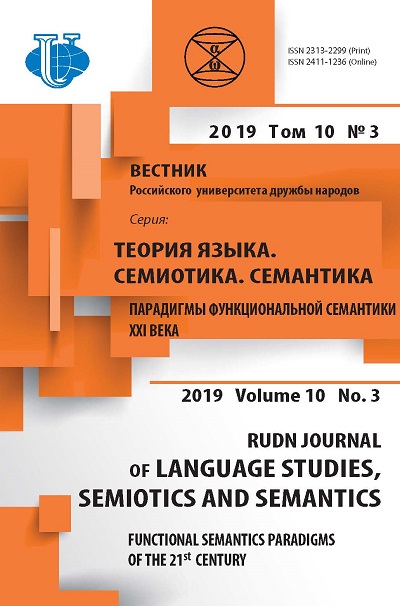Semantic volume of the word Conviction in the Words and Homilies of the Russian saints of the 20th century
- Authors: Koreneva Y.V1
-
Affiliations:
- Moscow regional state university
- Issue: Vol 10, No 3 (2019): Functional Semantics Paradigms of the 21st century
- Pages: 665-672
- Section: LEXICO-SEMANTIC TRANSFORMATIONS: FROM WORD TO TEXT ↔ FROM TEXT TO WORD
- URL: https://journals.rudn.ru/semiotics-semantics/article/view/22124
- DOI: https://doi.org/10.22363/2313-2299-2019-10-3-665-672
- ID: 22124
Cite item
Full Text
Abstract
For the first time the article analyzes the semantics of the word conviction in the words and teachings of Russian saints of the twentieth century. The material is extracted from symphonies in the works of saints and from collections of sayings of Russian elders of the twentieth century. The article analyzes the semantics of the use of this word in religious texts as the implementation of religious discourse in comparison with the codified meaning of modern dictionaries. It is shown that the lexeme conviction is included in the etymological-word formative nest of semantics of different words in the modern Russian language ( court, judge, condemn, reason, judgment, fate, judicial , etc.) of the Indo-European root *dhe- (: *-dh-o: *dh-i-) with the semantics of establishment, action, and in addition with the prefix su- , which means combining or mixing, has negative appraisal and is Church Slavism in the Russian language not only by phonetic and orthographic signs, but primarily by semantic signs. The semantic difference in the religious and non-religious use of this word in the Russian and Church Slavonic language element is in the significative side, since in the Orthodox concept-sphere and the Russian religious discourse, conviction is associated with a number of conceptual ideas about the inner life of a person. Conviction is semantized as a destructive state of a person, violating the integrity of his personality and alienating him from God (the article identifies at least three semantic-cognitive features). Such semantic content clearly differs from lexicographical data in modern language, therefore the meaning of a word in Church Slavonic text space is understood as basic, and modern usage is understood as a narrowing of the original semantics.
About the authors
Yulia V Koreneva
Moscow regional state university
Author for correspondence.
Email: uv.koreneva@mgou.ru
Ph.D. philology, Associate Professor, Senior lecturer, Chair of history of Russian language and general linguistics
Moscow, RussiaReferences
- Karasik, V.I. (2008). Linguocultural concepts: Approaches to the study. In Sociolinguistics yesterday and today. Moscow. pp. 127—155. (In Russ.).
- Bobyreva, E.V. (2007). Religious discourse: values, genres, language characteristics. Monograph. Volgograd: Change. (In Russ.).
- Koreneva, Yu.V. (2012). The feat in language and text (the life of the venerable elders), Bulletin of the Moscow State Regional University. Series “Russian philology”, 1, 18—23. (In Russ.).
- Novikov, L.A. (1982). The semantics of the Russian language: Tutorial. Moscow: Highe School. (In Russ.).
- Dictionary of the Russian language: In 4 vol. (1981—1984). Academy of Sciences of the USSR, the Institute of Rus. language; A.P. Evgenieva (Ed.). Moscow: Russian language. [Electronic resource]: URL: http://slovari.ru/search.aspx?s=0&p=3068 (accessed: 07.02.2019). (In Russ.).
- The explanatory dictionary of the Russian language by S.I. Ozhegov and N.Yu. Shvedova [Electronic resource]: URL: http://slovari.ru/search.aspx?s=0&p=3068 (accessed: 07.02.2019). (In Russ.).
- Russian semantic dictionary. Explanatory Dictionary, systematized by classes of words and meanings. N.Yu. Shvedova (ed.). Moscow: Azbukovnik, 1998. [Electronic resource]: URL: http://slovari.ru/search.aspx?s=0&p=3068 (accessed: 07.02.2019). (In Russ.).
- Dictionary of the Russian language: In 4 toms. Academy of Sciences of the USSR, the Institute of Rus. language; Ed. A.P. Evgenieva. M.: Russian language, 1981—1984. [Electronic resource]: URL: http://slovari.ru/search.aspx?s=0&p=3068 (accessed: 07.02.2019). (In Russ.).
- Chernykh, P.I. (1993). Historical and etymological dictionary of the modern Russian language: 13,500 words: Vol. 1—2. Moscow. Vol. 1. (In Russ.).
- Sreznevsky, I.I. (1989.). Dictionary of the Old Russian language. In 3 vols. Moscow. (Reprint edition 1893—1912). [Electronic resource] URL: http://etymolog.ruslang.ru/ index.php?act=sreznevskij (accessed: 02.08.2019). Vol. 3. pp. 603—607. (In Russ.). (In Russ.).
- Weisman, A.D. (2006). Greek-Russian dictionary. Reprint of the V-th edition of 1899. Moscow: The Greek-Latin Cabinet of Yu.A. Shichalina. (In Russ.).
- Orthodox portal Alphabet of Faith. [Electronic resource] URL: https://azbyka.ru/osuzhdenie (accessed: 08.02.2019). (In Russ.).
- Symphony on the creation of rights. John of Kronstadt [Electronic resource]: URL: https://azbyka.ru/otechnik/Ioann_Kronshtadtskij/simfonija-po-tvorenijam-svjatogo-pravednogo-ioanna-kronshtadtskogo/168 (accessed: 08.02.2019). (In Russ.).
- Symphony in the works of the Rev. Optina Elders [Electronic resource]: URL: https://azbyka.ru/ otechnik/Spravochniki/simfonija-po-tvorenijam-prepodobnyh-optinskih-startsev-tom-1/264 (accessed: 07.02.2019). (In Russ.).
- Great Russian elders: Lives, miracles, spiritual instructions. (2000). Moscow: Trifonov Pechengsky monastery; New book; Ark. (In Russ.).
Supplementary files












